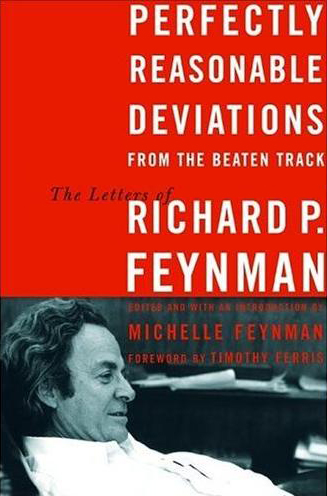
The Beautiful and Frightening Experience of How Science Is Done: Richard Feynman’s Letter to James Watson about The Double Helix
by Maria Popova
A manifesto for messiness and the value of the subjective in the advancement of knowledge.
In February of 1967, Richard Feynman —champion of scientific culture, graphic novel hero, crusader for integrity, existential sage,secret artist — visited the University of Chicago and ran into DNA godfather James Watson, also visiting at the time. Watson, who had met Feynman while guest-lecturing on the structure of DNA at Caltech, gave him the manuscript to what would become The Double Helix — one of the most influential books in the history of modern science. A couple of weeks later, Feynman sent Watson a poignant letter, included in Perfectly Reasonable Deviations From the Beaten Track: The Letters of Richard P. Feynman (public library) — the fantastic anthology that also gave us The Great Explainer’s irreverent Nobel wager — addressing Watson’s fears about the book and the controversy he knew it would generate by virtue of its subjective point of view.
Feynman’s letter doesn’t just address the specific subject directly — like all of his meditations, it touches on timeless, timelier than ever points about the value of the subjective, the caveats of criticism, and above all that science is oftenintuitive, messy, and full of ego-transcendence. He begins by reminding us ofwhat should be a cardinal rule of the internet:
Don’t let anybody criticize that book who hasn’t read it thru to the end. Its apparent minor faults and petty gossipy incidents fall into place as deeply meaningful and vitally necessary to your work (the book — the literary work I mean) as one comes to the end. From the irregular trivia of ordinary life mixed with a bit of scientific doodling and failure, to the intense dramatic concentration as one closes in on the truth and the final elation (plus with gradually decreasing frequency, the sudden sharp pangs of doubt) — that is how science is done. I recognize my own experiences with discovery beautifully (and perhaps for the first time!) described as the book nears its close. There it is utterly accurate.And the entire ‘novel’ has a master plot and a deep unanswered human question at the end: Is the sudden transformation of all the relevant scientific characters from petty people to great and selfless men because they see together a beautiful corner of nature unveiled and forget themselves in the presence of the wonder? Or is it because our writer suddenly sees all his characters in a new and generous light because he has achieved success and confidence in his work, and himself? Don’t try to resolve it. Leave it that way. Publish with as little change as possible. The people who say “that is not how science is done” are wrong. In the early parts you describe the impression by one nervous young man imputing motives (possibly entirely erroneous) on how the science is done by the men around him. (I myself have not had the kind of experiences with my colleagues to lead me to think their motives were often like those you describe — I think you may be wrong — but I don’t know the individuals you knew — but no matter, you describe your impressions as a young man.) But when you describe what went on in your head as the truth haltingly staggers upon you and passes on, finally fully recognized, you are describing how science is done. I know, for I have had the same beautiful and frightening experience.If you were really serious about wanting something on the flyleaf, tell me and we can work something out.
Feynman made good on his word: When the first hardcover edition of The Double Helix was published, it featured the following blurb from Feynman on the dust jacket: “He has described admirably how it feels to have that frightening and beautiful experience of making a great scientific discovery.”
Complement with Feynman on the meaning life, the role of scientific culture in modern society, and the universal responsibility of scientists.

No comments:
Post a Comment